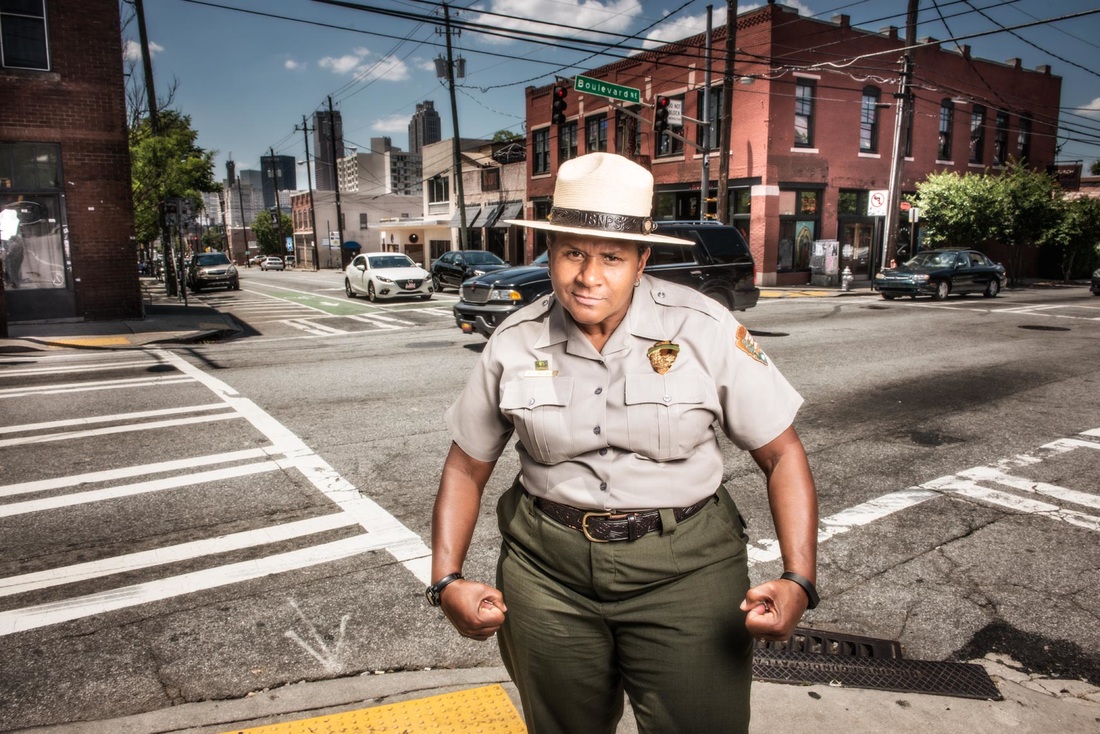 When Simon and I visited Gayle Hazelwood in Atlanta last summer, we had no idea what to expect. My good friend Don Barger had highly recommended we hunt Gayle down to interview her for our book. Don is the Southeast Regional Director of the National Park Conservation Association, and he said Gayle was the best interpreter at Martin Luther King, Jr. Historic Site he'd ever known. He also said that she had, at one time, the best business card in the Park Service: "Superintendent of Jazz". This was her title when she was Superintendent at New Orleans Jazz National Historic Park in Louisiana. Nothing could have prepared us for the dervish that we met in Ms. Hazelwood. Her energy is absolutely infectious, and the three of us became friends almost immediately. Gayle is not your average ranger. She's African-American. She's gay. She's a woman. And if that's not enough, she's 30% native American. She's also an urban park ranger - trying to engage a generation of youth whose experience of our country's history and heritage is a lot more concrete and cacophony than it is forest and waterfall. That is a formidable diversity package. Some 80% of this country's population lives in a "metropolitan area". We are an urban culture, becoming more so every day. The National Park constituency in this country is overwhelmingly white, and aging, unlike our general population which is trending younger and more colorful. To their credit, the National Park Service leadership is determined to turn the battleship and bring more relevance of its special landscapes to those for whom the end of the subway line might as well be the end of the world. Dozens of parks close to urban concentrations (Gateway National Recreation area in New York and New Jersey, Cuyahoga Valley in Cleveland, Chattahoochee River National Recreation Area in Atlanta, etc.) have been established, and the Park Service has set lofty goals for a new series of water trails, historic sites and urban recreation areas in its strategic plan for the second 100 years of its existence. The Park Service has also instituted a series of programs and partnerships intended to organize tours to the classic breathtaking landscapes of the Park System specifically for under-served groups in our society - Latinos, Asians, African-Americans, the urban poor. My daughter Linnea and her youth group friends walked the Freedom Trail in Boston this past summer - an urban experience that, through a thin line of contrasting bricks in the sidewalk pavement, draws you creatively through a number of historic places, a classic urban National Park Service creation - less a park than an experience. Still, the story this experience tells is the story of people who look like me, not like Gayle Hazelwood. The National Park Service challenge is to build a portfolio of new places that tell the stories of the subsets of humanity that have blended together into an American experience, places like the recently-designated Stonewall National Monument, or the Martin Luther King, Jr. National Historic Site - where we met Gayle. We middle-class suburban kids grew up on Yellowstone and the Grand Canyon, and it came as a surprise to me to find that there are 28 National Park Service sites focused on the history of the African-American experience in the United States, ranging from Little Rock Central High School in Arkansas, to the Frederick Douglass National Historic Site, to New Orleans Jazz National Historic Park and Jean Lafitte National Historic Park and Preserve, which we are to visit in just a couple of weeks when we travel to New Orleans to make a presentation to the national conference of the American Society of Landscape Architects. Gayle's story is remarkable in a number of ways, but the part I like the best is that music weaves through it all the way from her childhood in Ohio to her home in Atlanta, where she now serves as the Director of the National Park Service Urban Agenda. All roads seem to lead through New Orleans, though, and that's why I am so excited to be there soon amidst the smells of white pepper and onion, and within earshot of the finest musicians on the planet. To learn more about Gayle, read her story.
2 Comments
|
AuthorDaniel Howe lives in Raleigh, NC. He's interested in a lot of things so this blog is all over the place. Archives
May 2018
Categories |
City Planning / Public Process
|
|

 RSS Feed
RSS Feed
